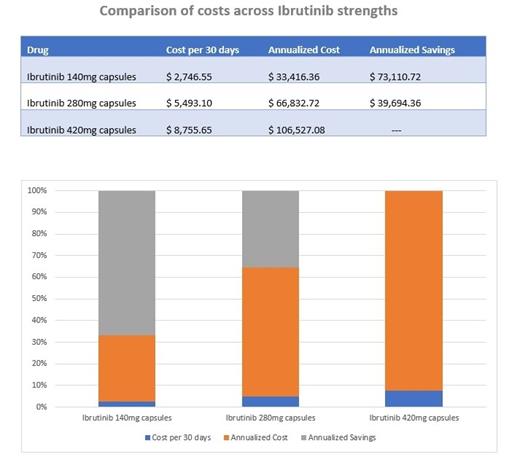Abstract
Ibrutinib is an inhibitor of Bruton's tyrosine kinase (BTK) that is used for the treatment of multiple hematologic malignancies including chronic lymphocytic leukemia (CLL) with promising outcomes. Its use has been associated with significant side effects including diarrhea, fatigue, infections, arthralgias, hemorrhage, and atrial fibrillation among others. Ibrutinib-associated adverse events have led to its discontinuation in more than one-fifth of CLL patients treated. Specifically, in the real-world setting, 21% to 30% of patients have needed an Ibrutinib dose interruption or reduction. Moreover, the associated toxicity seems to be more prominent in the geriatric population given the poor functional reserve, impaired mobility, and preexisting comorbidities. In the elderly, moderate to severe treatment-related toxicity often times leads to a higher number of hospitalizations, which ultimately increases the risk of complications and health care costs. Some studies have reported that Ibrutinib dose reductions have not had a significant impact on the progression-free-survival or overall survival in the general population. Nevertheless, there is not sufficient data or consent about the use of a reduced dose of Ibrutinib for treatment of CLL in frail older adults. In addition, annual costs of treatment with complete-dose Ibrutinib for veterans exceed $100,000. As it is common to reach complete remission with Ibrutinib monotherapy, patients will remain on therapy long-term, compounding financial impact over their treatment lifetime. Reduced dose Ibrutinib can lower total cost by 50% or more and thereby increase patient adherence due to decreased economic burden. Therefore, we present a retrospective review of a series of 7 cases involving frail older adults with CLL treated with Ibrutinib at the Washington DC Veterans Affairs Medical Center. Six out of seven patients received a reduced Ibrutinib dose and had a complete response whereas one patient received the dose recommended by the manufacturer leading to a prolonged hospital stay due to the adverse effects. We report the disease control evidenced by a decrease in white blood cell count, alleviation of "B symptoms", and resolution of lymphadenopathy along with side effects with an Ibrutinib dose ranging from 140 to 280 mg per day. We also report the cost benefits obtained with the use of a reduced Ibrutinib dose. We hope that sharing our experience encourages clinical trials aiming to determine the minimal dose needed to effectively treat CLL while limiting toxicity, decreasing health care costs, and preserving quality of life in frail older adults.
No relevant conflicts of interest to declare.


This feature is available to Subscribers Only
Sign In or Create an Account Close Modal